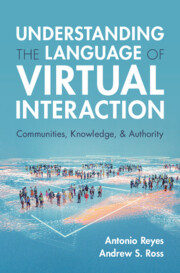Book contents
- Understanding the Language of Virtual Interaction
- Understanding the Language of Virtual Interaction
- Copyright page
- Contents
- Figures
- Tables
- 1 Introduction
- 2 Web 2, a Digital Revolution?
- 3 Digital Communication and the “Post-Truth” Era
- 4 The Formation of Virtual Communities
- 5 The Negotiation of Meaning, Knowledge, and Authority Online
- 6 (De)Legitimization of Authority in Digital Communication
- 7 Competition with Official Institutions
- 8 Politics and Participation in the Digital Public Sphere
- 9 Human Rights and Social Change in Virtual Spaces
- 10 Discourse and Identity in a Lawless Digital Universe
- 11 Conclusion
- References
- Index
3 - Digital Communication and the “Post-Truth” Era
Published online by Cambridge University Press: 05 September 2025
- Understanding the Language of Virtual Interaction
- Understanding the Language of Virtual Interaction
- Copyright page
- Contents
- Figures
- Tables
- 1 Introduction
- 2 Web 2, a Digital Revolution?
- 3 Digital Communication and the “Post-Truth” Era
- 4 The Formation of Virtual Communities
- 5 The Negotiation of Meaning, Knowledge, and Authority Online
- 6 (De)Legitimization of Authority in Digital Communication
- 7 Competition with Official Institutions
- 8 Politics and Participation in the Digital Public Sphere
- 9 Human Rights and Social Change in Virtual Spaces
- 10 Discourse and Identity in a Lawless Digital Universe
- 11 Conclusion
- References
- Index
Summary
This chapter presents a discussion about the interconnection between the proliferation of sources of information in a “post-truth” era. In particular, it considers the question of what the concept of “post-truth” actually means in the context of prevailing understandings of veracity and sincerity in discourse and communication. It also places this notion against the broader discursive practice of (de)legitimization and how the digital environment has added layers of complexity to how users – citizens – negotiate information and the idea of truth. In particular, attention is given to how mis- and disinformation in a post-truth context can be proliferated and disseminated in the online context and the specific features of communication the users might utilize to do so. Overall, this chapter explores current understandings of the notion of post-truth in public discourse before focusing more explicitly on how it is used in public discourse by influential actors such as Donald Trump. It will also consider the role that post-truth discourse plays in populist discourse as well the issues posed in broader online communication in the virtual context.
Information
- Type
- Chapter
- Information
- Understanding the Language of Virtual InteractionCommunities, Knowledge, and Authority, pp. 27 - 43Publisher: Cambridge University PressPrint publication year: 2025
Accessibility standard: WCAG 2.2 AAA
Why this information is here
This section outlines the accessibility features of this content - including support for screen readers, full keyboard navigation and high-contrast display options. This may not be relevant for you.Accessibility Information
Content Navigation
Allows you to navigate directly to chapters, sections, or non‐text items through a linked table of contents, reducing the need for extensive scrolling.
Provides an interactive index, letting you go straight to where a term or subject appears in the text without manual searching.
Reading Order & Textual Equivalents
You will encounter all content (including footnotes, captions, etc.) in a clear, sequential flow, making it easier to follow with assistive tools like screen readers.
You get concise descriptions (for images, charts, or media clips), ensuring you do not miss crucial information when visual or audio elements are not accessible.
You get more than just short alt text: you have comprehensive text equivalents, transcripts, captions, or audio descriptions for substantial non‐text content, which is especially helpful for complex visuals or multimedia.
Visual Accessibility
You will still understand key ideas or prompts without relying solely on colour, which is especially helpful if you have colour vision deficiencies.
You benefit from high‐contrast text, which improves legibility if you have low vision or if you are reading in less‐than‐ideal lighting conditions.
